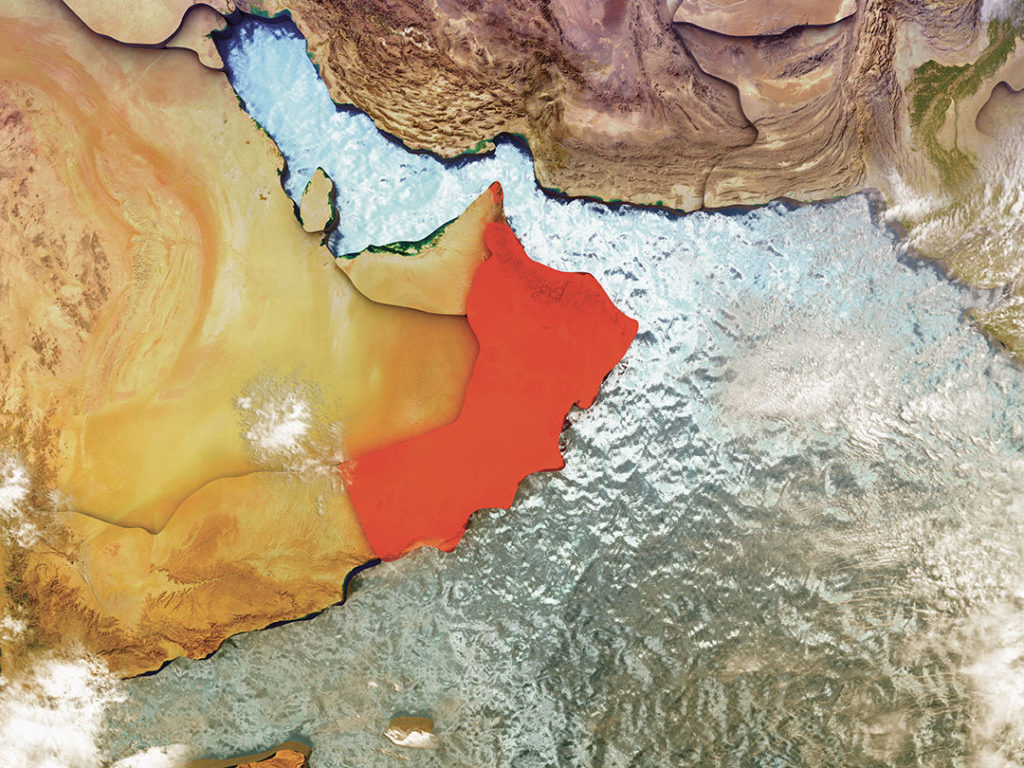Oman’s security and prosperity depend on the smooth flow of commerce through the Indian Ocean
COMMODORE KHAMIS BIN SALIM AL JABRi, ROYAL NAVY OF OMAN
Oman has a long historical relationship with the sea. Its 3,165-kilometer coastline, noncontiguous territory and strong trading relationships across the Indian Ocean mean that maritime security has been paramount for the nation.
The Indian Ocean has always been less a barrier than an opportunity. Oman boasted a strong Navy as early as the year 807, and by the year 1000 Omani merchant ships had reached China and beyond.
By virtue of its strategic location, Oman has a distinct advantage over other regional states involved in maritime trade and has always looked outward to the Indian Ocean as opposed to the enclosed Arabian Gulf.
As a maritime hub, Oman has enjoyed diplomatic relations with distant nations such as China, Britain, France, the United States and India. Hence, it is not surprising that a country like Oman, whose history is so closely connected with the sea, can claim to have been the only nation on the Arabian Peninsula to have had a sea-based empire. It is no exaggeration to say that Oman’s rulers established a sea-based empire between the 17th and 19th centuries that stretched from inside the Arabian Gulf, along southern Iran to the East African coast. This state of affairs lasted into the 19th century. The area shaded red in the map to the right indicates the influence of Oman in the mid-19th century.
The importance of seagoing trade and communication remains undiminished. The Indian Ocean represents 20 percent of the world’s surface area and plays a disproportionate role in global trade.

Sixty percent of the world’s population lives on or near the Indian Ocean. Sixty percent of global seaborne trade passes through the region. For nations such as India, these waters are literally a lifeline, providing passage for 90 percent of its imports and exports. For China, the figure is more than 60 percent.
Energy shipments are particularly dependent on the Indian Ocean and adjoining waters. The coastline of the Arabian Peninsula is laced with large networks of pipelines and ports handling oil and gas shipments. Two-thirds of oil from the Arabian Gulf region is shipped to Asia, almost all by vessels plying the Indian Ocean region.
Four major chokepoints provide passage for these large tankers: the Strait of Hormuz (17 million barrels a day), the Strait of Malacca (15 million barrels a day), the Suez Canal (4.5 million barrels a day), and the Bab el-Mandeb strait (3.8 million barrels a day).
Omani territory juts into and overlooks the Strait of Hormuz with the Traffic Separation Scheme in Omani territorial waters. This relatively shallow channel, only 21 miles wide at its narrowest, teems with vital seaborne traffic.
What all this means is that maritime security in the Indian Ocean is vital not just for Oman, but for the world. Oman has five main ports that handle trading vessels, cruise ships and fishing boats.
Its two most prominent ports, Salalah and Duqm, are strategically situated on the Arabian Sea. The other ports are Port Sultan Qaboos and Sohar on the Sea of Oman and Port Khasab in the Musandam governorate in the Arabian Gulf.
In protecting the maritime environment on which my nation depends, we have identified seven main challenges — smuggling and trafficking, pollution, piracy, terrorism, illegal fishing and overfishing.
Tackling these challenges requires multinational cooperation. No single nation can combat these problems within its own resources in so fluid an environment as the Indian Ocean.
Oman is interested in maintaining a strong maritime capability to support and underwrite its foreign and security policy. Oman takes pride in upholding its international obligations while defending the sovereignty of the nation. We realize that the policies we adopt will determine how secure and prosperous we remain.
Overall, we in Oman have always dedicated ourselves to peaceful resolutions of conflicts. Oman’s foreign and security policy is built upon a doctrine of peaceful coexistence with all nations. As His Majesty Sultan Qaboos bin Said stated in 1994: “Peace is a principle in which we believe and a goal which we are striving to achieve without ceasing and without excess.”
This article was condensed from a speech delivered to regional alumni of the U.S. Naval War College in Oman in late 2017.

